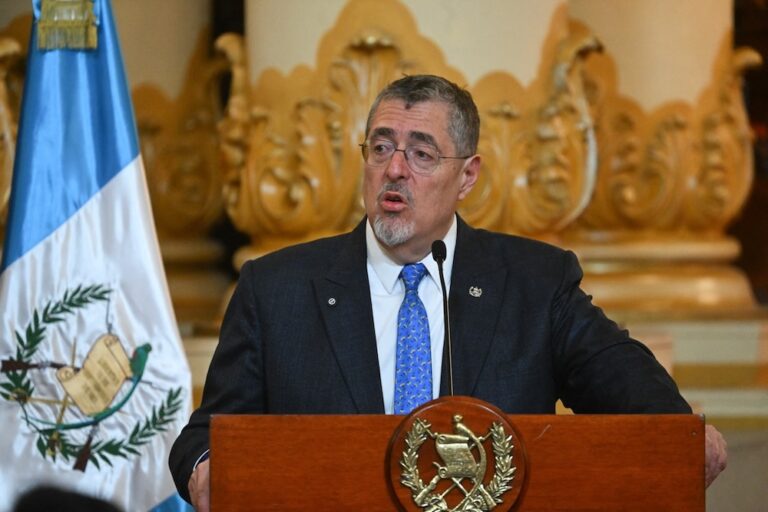(IAPA/IFEX) – The following is an 11 December 2001 IAPA press release: IAPA welcomes reopening of Flaquer case in Guatemala MIAMI, Florida (December 11, 2001) – Guatemalan Attorney General Adolfo González Rodas told the Inter American Press Association (IAPA) that the case of journalist Irma Flaquer Azurdia, who disappeared in 1980 after being kidnapped, is […]
(IAPA/IFEX) – The following is an 11 December 2001 IAPA press release:
IAPA welcomes reopening of Flaquer case in Guatemala
MIAMI, Florida (December 11, 2001) – Guatemalan Attorney General Adolfo González Rodas told the Inter American Press Association (IAPA) that the case of journalist Irma Flaquer Azurdia, who disappeared in 1980 after being kidnapped, is being officially reopened.
He made the announcement when an IAPA delegation visited him in Guatemala City yesterday.
The move has a special significance for the hemispheric free-press organization, which began its own inquiries into Flaquer’s disappearance in 1995 as part of its Unpunished Crimes Against Journalists project – an attempt to combat the impunity that surrounds the murder of hundreds of journalists throughout the Americas in the past decade.
“With this new step we can now say that our mission’s objectives are being realized,” said IAPA President Robert Cox, a reference to an “amicable agreement” the IAPA reached with the Guatemalan government earlier this year in which the current Guatemalan administration acknowledged responsibility for failure to solve the Flaquer case.
Cox, assistant editor of The Post and Courier, Charleston, South Carolina, added that “we know that this is a difficult case and that the new investigation could open some old wounds in the country, but we are also sure that it is the only way to really combat impunity and bring about such desired peace.”
During yesterday’s visit by IAPA officers, Attorney General González Rodas said that he has a strong commitment to freedom of the press and immediately announced that the case would be reopened. He named Gustavo Adolfo Barreno Quemé as special investigator to handle the case within the Office of the Special Prosecutor for Crimes Against Journalists.
The IAPA representatives – Gonzalo Marroquín, Prensa Libre, Guatemala City, and Press Freedom Coordinator Ricardo Trotti – expressed gratitude to the attorney general and put at his office’s disposition all the documentation the organization has been compiling over the past six years in its investigation into the case.
They told him that the reopening of the Flaquer case was of vital importance because “it can well serve to encourage the judiciaries of other countries to reactivate forgotten investigations.”
Marroquín and Trotti were accompanied in their visit to the attorney general’s office by Olmedo España Calderon and Oswaldo Enríquez Contreras, fellow members of the Impetus Committee established jointly by the IAPA and the Guatemalan government to oversee compliance with the “amicable agreement” which was signed on March 2 this year under the auspices of the Inter-American Commission on Human Rights.
The 12-point agreement provides for financial reparation to the victim’s family members and a number of ceremonies to honor Flaquer’s memory, including the one held in Guatemala City on September 5 in which a city street was named for her and a commemorative bronze plaque was placed on the downtown monument to freedom of expression.
Flaquer, noted for the outspoken newspaper column she wrote in the La Nacion newspaper from 1971 to 1980 titled “Los que otros callan” (What Others Do Not Talk About), in which she exposed political repression, government and military corruption and human rights violations. She was kidnapped on October 16, 1980, and has never been seen since. Her son was killed in the incident.


